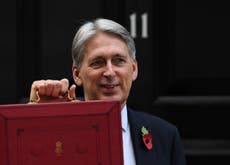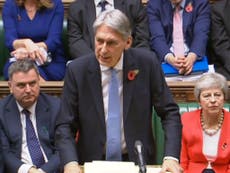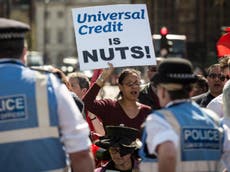Philip Hammond made it obvious: this Budget was made with an election in mind
Here was an attempt to buy off opponents and voters alike, with 'little extras' for schools which will pay for crumbling buildings and pens and paper, and a 50p coin for the grumbling Brexiteers. But everything will be irrelevant if we crash out of the EU

The greatest challenge facing the country barely featured at all in Philip Hammond’s Budget statement – apart from the briefest of mentions of extra funding to deal with Brexit contingencies. But, ultimately, the chancellor’s set-piece event had everything to do with the UK’s withdrawal from the EU. If the country is in a holding pattern as it awaits the final outcome of negotiations with Brussels, so too are the nation’s finances. Major fiscal decisions cannot take place until next year’s post-Brexit spending review, and the legroom for the chancellor – whoever he or she may be by then – will depend on what sort of deal Theresa May strikes in the coming weeks.
But the government, without a parliamentary majority, under siege from its own backbenchers and fending off calls for a general election from Labour, is too weak to get through a steady-as-she-goes, let’s-wait-until-Brexit Budget. Instead, Hammond – railroaded into spending commitments by the prime minister declaring at party conference that the age of austerity was ending – had to conjure up pots of cash for popular causes and bubbling crises alike.
In government spending terms, however, they were more like thimbles than pots.
There was £420m for potholes and other road repairs, £650m extra for social care, £400m for cash-strapped schools and £675m for the struggling high street.
There was an extra £1bn for universal credit, designed to head off growing protests from both Labour and Conservative MPs over how much low income families are losing. There was the £20bn extra for the NHS that had already been announced by May earlier this year. By bringing forward the raising of the personal income-tax allowance and higher rate threshold to next April, he announced an effective tax cut of an average £130 for 32 million people.
Apart from the £500m extra for defence spending – which allowed Hammond to take a swipe at Jeremy Corbyn’s opposition to the nuclear deterrent and claim that people could “sleep safer in their beds” – much of the new money was funding that could be “sold” locally, on a Conservative election leaflet, for example: aimed at the communities, struggling small businesses and “hardworking families” the government is desperate to win over. In fact, so much of Hammond’s statement was dedicated to either shooting Labour foxes or pitting the opposition as the enemies of hard work and national security that anyone would think we were at the start of an election campaign. It was an electioneering Budget without an election, the start of a phoney war campaign which could end in the country going to the polls yet again.
Corbyn and shadow chancellor John McDonnell should feel flattered, I suppose, that the chancellor stole so many of Labour’s clothes: their calls for an “Amazon tax” was heeded with a new “digital services tax” which will focus on tech giants who get away with astoundingly low corporation tax bills in the UK – although this will raise just £400m per year from April 2020, a small amount in government spending terms.
Another target of Corbyn and McDonnell, the private finance initiative (PFI), which has locked schools and hospitals into expensive contracts, was taken up by Hammond, who promised to abolish it – although in reality no new contracts have been signed for years. Elections are often, on a seat-by-seat scale, as much about parish pump issues as they are about national debates, and so the chancellor had money for community newspapers and public toilets – looking after local news and local loos.
Hammond claimed, as he concluded his Budget statement, that there is now a “clear dividing line” between the Conservatives’ and Labour’s approach to the economy: even though austerity is coming to an end, he claimed, the government will maintain tight discipline on public finances, unlike Corbyn and McDonnell who would, he said, splurge away any hard-won savings. Yet these words are undermined by the Treasury’s own Red Book, which shows a massive increase in public spending by £30bn by 2023/24, most of which will be spent on keeping the NHS from disaster. Hammond said he came into politics to cut taxes, but his plans show he is using a better-than-expected financial position to spend money rather than reduce individuals’ tax burdens.
The chancellor opened his Budget statement with bold claims about “Britain’s jobs miracle” and the end of austerity, which would “pave the way for a brighter future”, appealing to “hardworking families who care little for the twists and turns of Westminster”. Yet the truth is, for those very hardworking families, their own household budgets are not so rosy after years of austerity.
Wage inflation has been so sluggish it has dragged on household finances, zero-hours contracts have increased, the NHS and social care have been starved of cash and headteachers are having to run literal marathons to raise money to fund shortfalls in school budgets. When Hammond announced £400m for schools – which is, it should be noted, less than the pot of extra cash for potholes and will only be a one-off payment – he described it as money that could be used to pay for “little extras”. Repairs to crumbling school buildings, money for electricity bills so teachers don’t have to mark work in dusk light, and pens, paper and books are essentials, not “little extras”.
To put it kindly, Hammond had little choice but to announce tokenistic pots of money on vote-winning policies. The government is cornered from all directions: on the Labour benches, in the Conservative ranks – including the Brexiteers who got a special Brexit 50p piece – and by the DUP.
This Budget was an attempt to buy off opponents and voters alike, just in case yet another election beckons in the uncertain weeks ahead. Yet every policy announcement and every pound spent is irrelevant if Brexit crashes into a no deal. No 10 may insist that this scenario will make no difference to public spending – yet, as the chancellor said himself at the weekend, an emergency Budget will be on the cards if there is no deal. For now, Britain remains in a holding pattern, and it’s going to take more than a sprinkling of cash here and there to change that.






Join our commenting forum
Join thought-provoking conversations, follow other Independent readers and see their replies